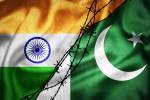India-Pakistan Conflict

A Quick Introduction to the India-Pakistan Relationship
The relationship between India and Pakistan has been characterized by a complex history filled with conflicts, disputes, and occasional attempts at reconciliation. Here are some interesting facts about the India-Pakistan relationship:
Partition: India and Pakistan gained independence from British rule in 1947. The partition of British India into two separate nations, India and Pakistan, resulted in one of the largest mass migrations in history and led to communal violence and the loss of millions of lives.
Kashmir Conflict: The territorial dispute over the region of Kashmir has been a significant point of contention between India and Pakistan since their independence. Both countries claim the entire region but control only parts of it. This dispute has led to several wars and skirmishes between the two nations.
Wars and Conflicts: India and Pakistan have fought three major wars: in 1947-48, 1965, and 1971. These wars were primarily over territorial disputes, particularly Kashmir. There have also been smaller conflicts, such as the 1999 Kargil War.
Nuclear Powers: Both India and Pakistan are nuclear-armed nations. India conducted its first nuclear test in 1974, while Pakistan conducted its first nuclear test in 1998. The nuclearization of both countries has added a new dimension of complexity to their relationship.
Diplomatic Relations: India and Pakistan have had periods of tense diplomatic relations, including the suspension of bilateral talks and a lack of formal dialogue. However, there have also been efforts to improve relations, such as the Agra Summit in 2001 and the Lahore Declaration in 1999.
Cross-Border Conflict: The Line of Control (LoC) is the de facto border separating the Indian-administered Kashmir from the Pakistani-administered Kashmir. Violations and cross-border firing along the LoC have been common, leading to casualties on both sides.
Cricket Diplomacy: Cricket has played a unique role in India-Pakistan relations. The cricket matches between the two countries have often been highly anticipated and emotionally charged events. The game has been used as a means of diplomacy and a platform for promoting peace between the two nations.
Trade and Economic Relations: Despite the political tensions, India and Pakistan have engaged in some trade and economic cooperation. However, trade relations have been sporadic and subject to political fluctuations.
People-to-People Contacts: Despite the political and military conflicts, there have been instances of people-to-people interactions and cultural exchanges between India and Pakistan. Many families were divided during the partition, and efforts have been made to facilitate visits and reunions between separated family members.
Track-II Diplomacy: Track-II diplomacy refers to unofficial, non-governmental channels of communication between India and Pakistan. Various think tanks, academics, and civil society organizations have engaged in track-II initiatives to promote dialogue and understanding between the two countries.
The India-Pakistan relationship is complex and deeply rooted in history. While there have been periods of tension and conflict, there have also been attempts at reconciliation and dialogue. The future of the relationship will depend on the actions and policies pursued by both countries in the coming years.



